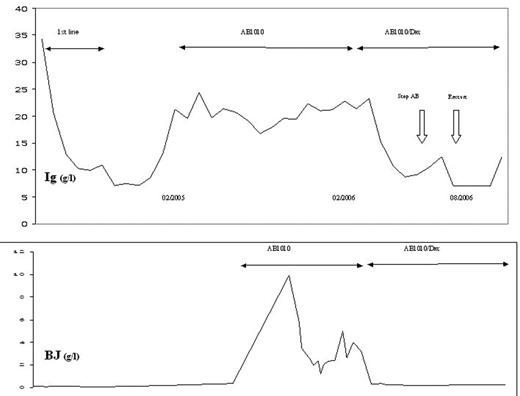Abstract
The t(4;14)(p16;q32), found in 15% of multiple myeloma (MM) cases, is associated with a short time to progression (TTP) despite a good initial response. In this subset of MM, relapses are resistant to conventional and intensive chemotherapy leading to a poor prognosis. Plasma cells with t(4;14) ectopically express the fibroblast growth factor receptor 3 (FGFR3), a tyrosine kinase receptor which has proven transforming activity and may represent a therapeutic target. We have studied the safety and efficacy of AB1010, an FGFR3 tyrosine kinase inhibitor, in patients with relapsing/refractory t(4;14) MM. 24 MM patients (M 33%, F 67%, median age 55 years) with t(4;14) were enrolled. FGFR3 expression was detected in all but one patient. AB1010 (9 mk/kg/d) was given orally and Dexamethasone (Dex) (40 mg/d X4d/month) was added if progression. In case of explosive relapse (defined by deep cytopenia, renal failure, circulating plasma cells), a chemotherapy was given followed by a wash out period of 1 month before start of AB1010. Two patients were enrolled after the first line of treatment at a plateau state with a response < 75% (<75% decrease of the monoclonal component). Among the 24 patients, 19 were evaluable since 5 had a duration of treatment < 1month. The main toxicities were gastrointestinal (nausea 63,5%, grade I/II, diarrhoea 25%, grade I; anorexia 25%, grade II) and oedema (face 50%, grade I/II and legs 24% grade I). Hematological toxicities were limited to a transient grade III neutropenia in one patient. Dex was added in all cases. Six patients (3 in 1st relapse, 3 in >3rd lines) had explosive relapse. Treatment regimen before start of AB1010 were :VTD (4); Thal/Dex (1); MLPHD (1). In these 6 cases, the TTP range from 1,5 to 4 months. 11 patients had non explosive relapse. Of these, 5 were in 1st relapse in whom 1 near CR (figure) and 1 PR were observed, with a median TTP of 10 months. Six patiens were in > 2nd relapse and 2 MR were obtained. Of the 2 remaining patients enrolled at plateau, 1 progressed at 6 and 1 is still on going after 13 months. In conclusion, AB1010, in combination with Dex, is well tolerated and may be useful in the treatment of patients with t(4;14) MM, especially in early phase of the disease. Responses were observed (40%) in patients with first relapse with a TTP superior as compared to the reported one (4,7 months with Thalidomide/Dex, Jaksic et al, 2006). Given the synergistic effect on MM cells proliferation observed in vitro, a study is now on going to test the safety and the efficacy of the combination AB1010 + Dex + Velcade in early relapsing patients with t(4;14) MM.
Author notes
Dislcosure: No relevant conflicts of interest to declare.


This feature is available to Subscribers Only
Sign In or Create an Account Close Modal